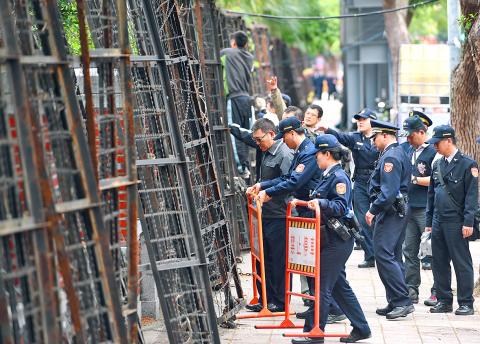As the nation commemorates the anniversary of the Sunflower movement, civic groups are calling for renewed attention on the legislative progress of a proposed cross-strait agreement oversight bill.
The passage of an oversight bill was one of the three main demands of last year’s landmark protests, which were triggered by Chinese Nationalist Party (KMT) Legislator Chang Ching-chung’s (張慶忠) attempt to ram through the proposed service trade pact with China within 30 seconds.
Tens of thousands of protesters took to the streets in March and early April last year, demanding an oversight bill that would set clear legal parameters for future cross-strait negotiations.

Photo: Liao Chen-huei, Taipei Times
With eight versions of the proposed oversight bill currently under legislative review, civic groups yesterday held a public forum outside of the Legislative Yuan in Taipei last night, inviting members of the public to participate in discussions on the issue.
While the Executive Yuan has been touting its own version of the oversight bill, civic groups and the Democratic Progressive Party (DPP) said that the government’s version lacked teeth and “failed to provide any meaningful oversight.”
The remaining seven versions were proposed by: the DPP legislative caucus; the Taiwan Solidarity Union (TSU) legislative caucus; KMT Legislator Johnny Chiang (江啟臣); DPP Legislator Lee Ying-yuan (李應元); DPP Legislator Cheng Li-chiun (鄭麗君); DPP Legislator Pasuya Yao (姚文智); and a joint proposal by DPP Legislator Yu Mei-nu (尤美女) and civic groups.
The Economic Democracy Union, the main organizer of the forum, said that the Mainland Affairs Council declined its invitation to attend the event on the grounds that it had already hosted an online public forum on Wednesday night.
About 150 people trickled into the forum’s outdoor venue last night to participate in the event, which featured the four DPP legislators explaining their version of the act, as well as TSU caucus whip Lai Chen-chang (賴振昌).
The forum converged on a discussion of three issues: the oversight bill’s wording in defining cross-strait relations; the bill’s stance on human rights issues; and its provisions on the Legislative Yuan’s authority in monitoring cross-strait negotiations.
Taiwan Democracy Watch convener Hsu Wei-chun (徐偉群) said that the Executive Yuan’s version was detrimental to the nation’s sovereignty, as it classified Taiwan and China as parts of the same country under the KMT’s framework of “one country, two areas.”
He said versions that defined the two entities simply as China and Taiwan were acceptable, while versions employing the terms “People’s Republic of China” and “Republic of China” should be considered as “the bottom line.”
Cheng said that the oversight bill has been stuck in limbo at the Legislative Yuan’s plenary session, saying that the executive yuan’s refusal to withdraw its version of the oversight bill has prevented further substantive discussions

Taipei has once again made it to the top 100 in Oxford Economics’ Global Cities Index 2025 report, moving up five places from last year to 60. The annual index, which was published last month, evaluated 1,000 of the most populated metropolises based on five indices — economics, human capital, quality of life, environment and governance. New York maintained its top spot this year, placing first in the economics index thanks to the strength of its vibrant financial industry and economic stability. Taipei ranked 263rd in economics, 44th in human capital, 15th in quality of life, 284th for environment and 75th in governance,

Greenpeace yesterday said that it is to appeal a decision last month by the Taipei High Administrative Court to dismiss its 2021 lawsuit against the Ministry of Economic Affairs over “loose” regulations governing major corporate electricity consumers. The climate-related lawsuit — the first of its kind in Taiwan — sought to require the government to enforce higher green energy thresholds on major corporations to reduce emissions in light of climate change and an uptick in extreme weather. The suit, filed by Greenpeace East Asia, the Environmental Jurists Association and four individual plaintiffs, was dismissed on May 8 following four years of litigation. The

A former officer in China’s People’s Liberation Army (PLA) who witnessed the aftermath of the 1989 Tiananmen Square massacre has warned that Taiwan could face a similar fate if China attempts to unify the country by force. Li Xiaoming (李曉明), who was deployed to Beijing as a junior officer during the crackdown, said Taiwanese people should study the massacre carefully, because it offers a glimpse of what Beijing is willing to do to suppress dissent. “What happened in Tiananmen Square could happen in Taiwan too,” Li told CNA in a May 22 interview, ahead of the massacre’s 36th anniversary. “If Taiwanese students or

The New Taipei City Government would assist relatives of those killed or injured in last month’s car-ramming incident in Sansia District (三峽) to secure compensation, Mayor Hou You-yi (侯友宜) said yesterday, two days after the driver died in a hospital. “The city government will do its best to help the relatives of the car crash incident seek compensation,” Hou said. The mayor also said that the city’s Legal Affairs, Education and Social Welfare departments have established a joint mechanism to “provide coordinated assistance” to victims and their families. Three people were killed and 12 injured when a car plowed into schoolchildren and their